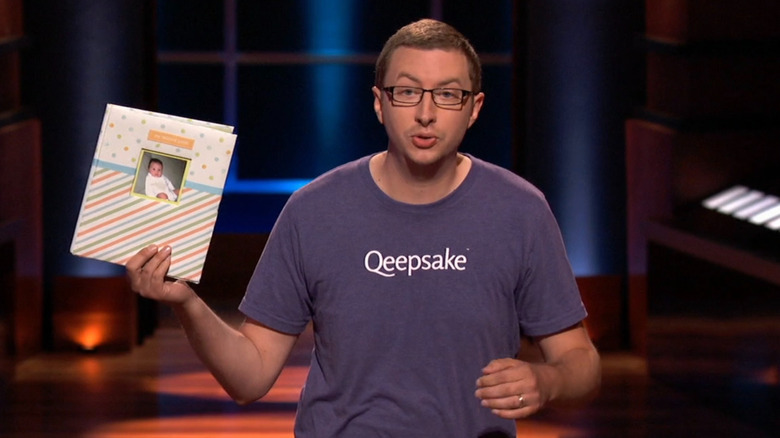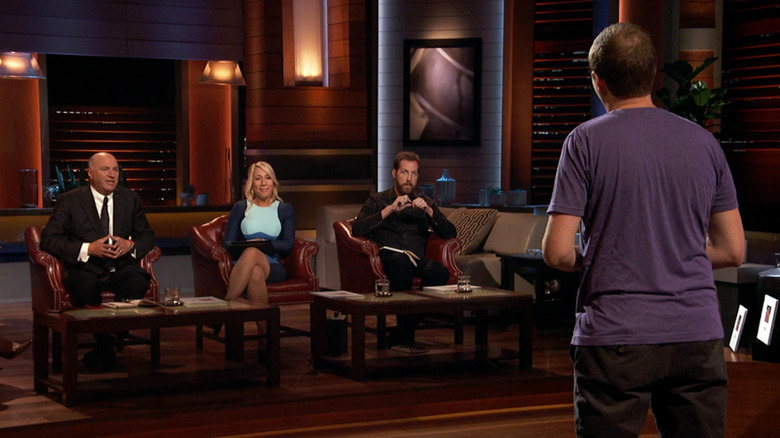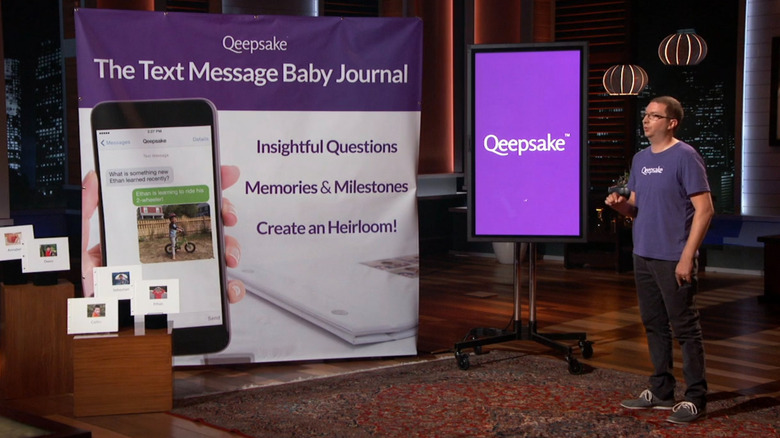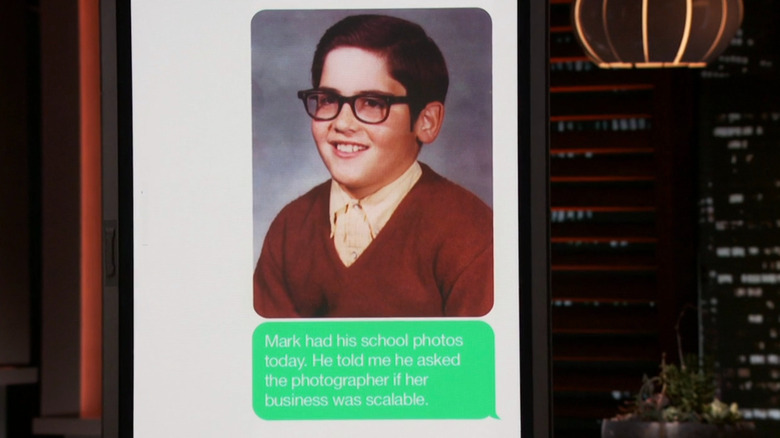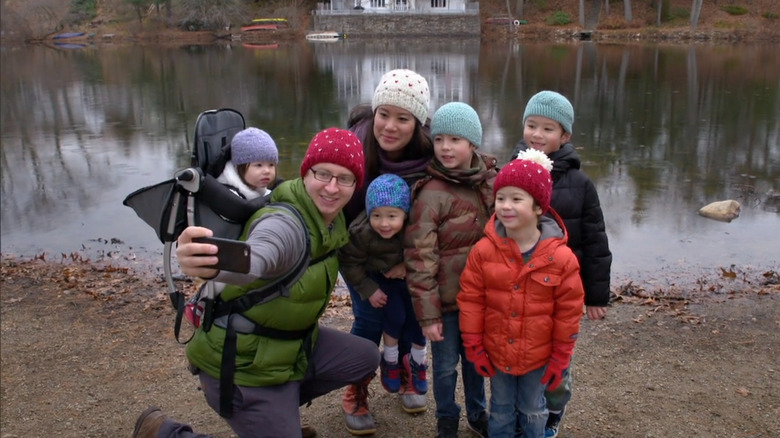What Happened To Qeepsake From Shark Tank Season 9?
Raising kids is an experience chock full of memories you'll want to cherish forever. For years, parents have kept books full of photos and notes to record such moments, but this can be difficult to keep consistent track of overtime. Bringing this tradition into the modern age is Qeepsake, a text-based journal that sends out prompts for journal entries about your child's milestones and curates photo galleries that can be turned into physical personalized albums.
As with many businesses, the idea for Qeepsake started as the solution to a problem plaguing its founder. Jeff McNeil and his wife Stephanie had their hands full with four kids at the time. Not only was caring and keeping track of them a hassle, but the couple also found it near impossible to document their family's moments and milestones. Jeff, who possessed a background in web and UX design, took on the challenge by creating Qeepsake. Feeling that the idea had merit for other families, he moved ahead with the idea as a business, officially launching the company in late 2015.
Qeepsake would make a memory for itself by appearing on "Shark Tank" Season 9. Standing out from more conventional app-based services from this season such as the change alternative CoinOut and comparative pricer Savy Shopping, McNeil was successful in convincing the sharks of the merit of his company. Despite this, McNeil struggled to find a meeting ground with the Sharks while trying to strike a deal, ending the segment with a bold decision.
What happened to Qeepsake on Shark Tank?
Jeff McNeil entered "Shark Tank" with the intent of receiving a $350,000 investment for 10% of Qeepsake. After giving a rundown of the service, McNeil showcased what Qeepsake could do by showing humorous childhood photos of the investors on the panel, which received a warm reaction from the Sharks. The business ran on a subscription model that went for between $40 and $95 annually. At this point, the company had amassed 40,000 active users, with 16% of its user base being converted to paid subscribers.
Even though only four books had been sold, the high conversion rate made McNeil confident that demand would increase overtime. Additionally, McNeil had gotten the company to a place where it was sustaining itself, and he could bring in a regular salary, with $250,000 in revenue made in the past four months alone. He felt that the personal touch that Qeepsake allowed for and features such as its hundreds of pre-made age-categorized questions set it apart from similar platforms.
Many of the Sharks were delightfully surprised by how well the company had endured. However, investors Barbara Corcoran, Lori Greiner, and Mark Cuban all dropped out, either feeling they were ill-fit as partners or that competition would become a big issue later on. Kevin O'Leary and Chris Sacca each offered the $350,000 for 20%, with O'Leary later exiting the deal after growing impatient. Despite providing Sacca with a strong argument as to why he placed such value on the company, the investor refused to lower his ask. With that, McNeil kindly declined.
Qeepsake after Shark Tank
Not getting a deal on "Shark Tank" is far from the kiss of death some viewers may believe it to be. Given the immense viewership any given episode can obtain, contestants typically receive an influx of website traffic, sales, and messages, a phenomenon known as the "Shark Tank" effect. For businesses that fail to get a shark on board, this boost can prove to be surprisingly fortuitous, as would be the case for Qeepsake.
The company's segment aired on October 29, 2017. The attention turned out to be just what Qeepsake needed, and Jeff McNeil reflected positively about his time on the show as a result, stating in a PR statement, "Being on Shark Tank was an amazing opportunity for Qeepsake! Even though a deal wasn't struck, I felt validated that the sharks understood the significance of the opportunity I put in front of them and, equally important, the American public got to learn about Qeepsake!" From this notoriety, the company was able to gain new partnerships and even managed to raise over $900,000 from various investors. By 2022, this amount grew to $2 million in funding.
With their newfound resources, the Qeepsake team was able to vastly improve the scope and capabilities of their platform. New features came up overtime, such as maternity journaling for expecting mothers and a long-awaited video function that allowed users to trim and store videos in a digital journal.
Is Qeepsake still in business?
Even with further funding and new features, Qeepsake hasn't changed all that drastically since its time on "Shark Tank." Today, users can either sign up for the service through the Qeepsake website or by downloading the accompanying app, available for free on both the iOS App Store and Google Play. Users can opt into an annual subscription of either $47.88 or $95.66, depending on if they go for an Essentials or Premium plan.
Although there is no longer a full-on free option, both plans also allow for seven-day free trials to try them out. After picking a plan and building a personalized profile, users can either respond to text prompts or freely enter journal entries, the daily number allotted depending on the plan chosen. Photos and videos can be uploaded through the app and can later be turned into an album containing pictures, captions, and journal entries.
It sports high marks from users across the board, with a 4.5 out of five-star rating on Google Play and near perfect 4.9 rating average on the iOS App Store. Even though the price ad certain user interface details have received criticism, the majority of users find the app to be convenient and have plenty to offer parents at every stage.
What's next for Qeepsake and its founder?
Qeepsake's endurance in the aftermath of its "Shark Tank" episode is proof that getting on the show doesn't have to be an end-all-be-all situation, and that opportunities are around every corner. The service is sure to keep evolving and may even become one of the best baby tracking apps out there as time progresses. In fact, a change in management has already been taking place that could spell out a new chapter for the company in the near future. 2022 proved to be a seismic year for Qeepsake as after over half a decade of managing operations, founder Jeff McNeil stepped down from his role as CEO and has since taken on various Chief Financial Officer positions within the company while also working elsewhere as a small business consultant. In his place would be marketing expert Tracy Cho.
In a PR statement, Cho shared, "I believe that Qeepsake is a wellness product that can unlock so much value to parents, caretakers and families. Providing parents with a tool that takes care of their memory capturing and journaling needs in a positive way is what Qeepsake is all about. Journaling has so many health benefits but can be taxing for busy parents. Qeepsake takes that anxiety out of the equation and makes journaling one with your daily routine. I'm thrilled to join the Qeepsake team, and I can't wait to enhance the user experience to be more intuitive and relevant to parents' circumstances today." With years in digital marketing and strategy for major brands, Cho intends to use her expertise to reinvent Qeepsake's image with a fresh content marketing team.
